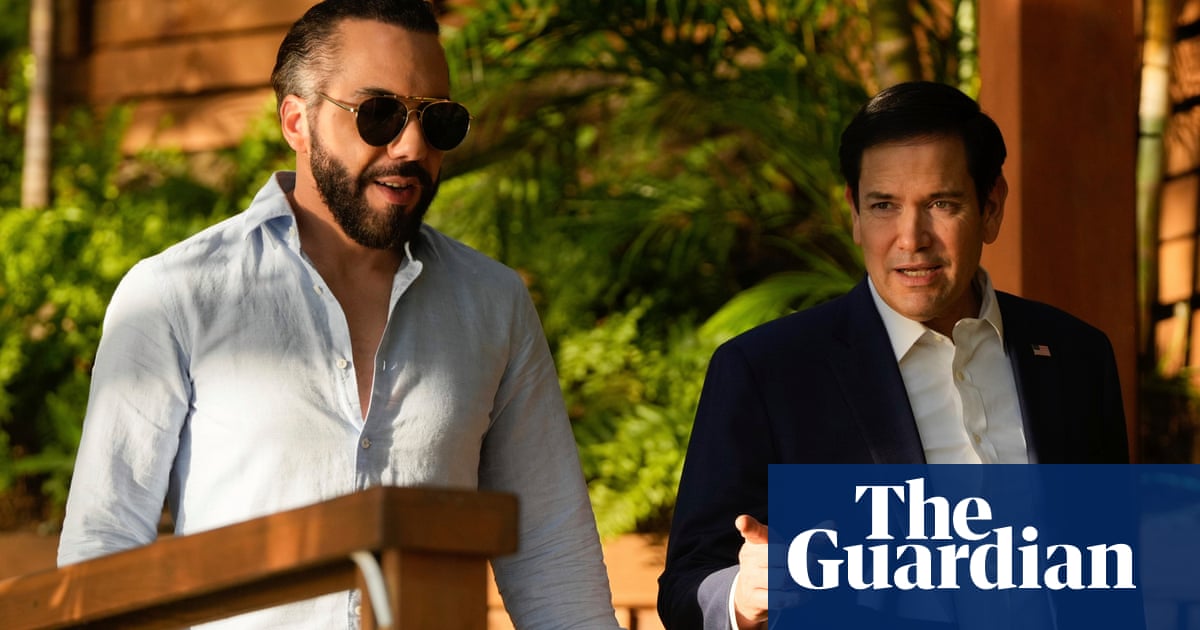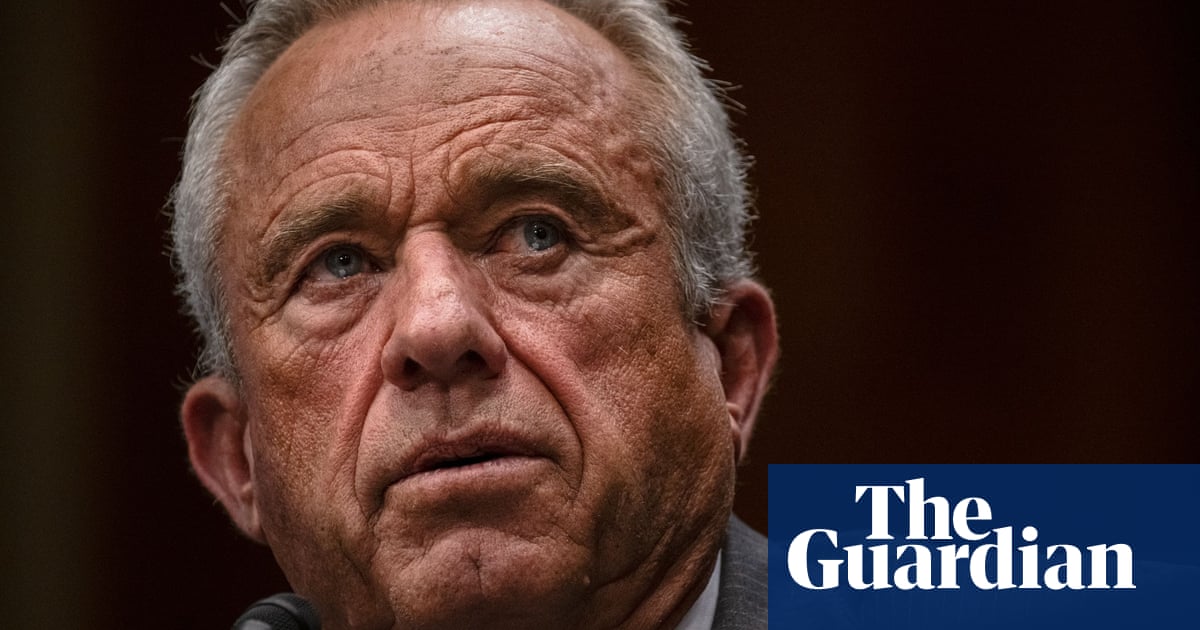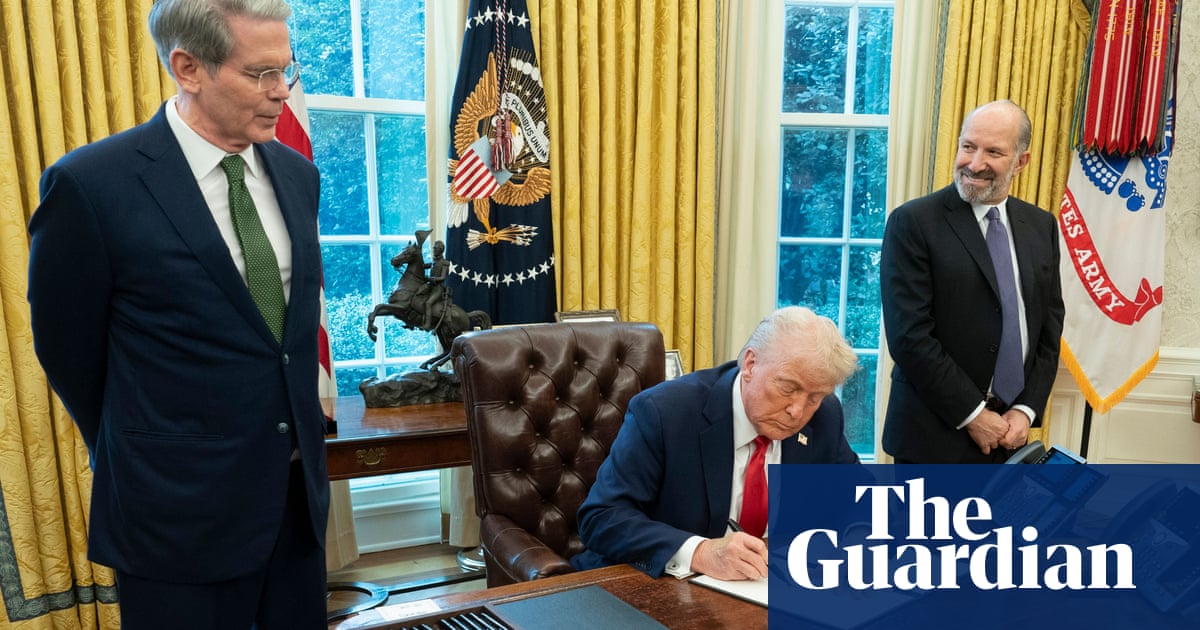Robert F Kennedy faces key Senate vote for health chief nomination
Robert F Kennedy’s candidacy to lead the health and human services department faces a crucial test on at 10am ET, when the Senate finance committee votes on whether to advance his nomination.
Kennedy has a long history of espousing conspiracy theories and anti-vaccine views, and it’s unclear if enough Republicans on the panel will back his nomination, despite the support of Donald Trump.
Even if the committee declines to advance him, the full Senate can still decide to vote to confirm Kennedy. Here’s a look back at how his confirmation hearing went last week:
Key events Show key events only Please turn on JavaScript to use this feature
Tulsi Gabbard’s chances of being approved by the Senate intelligence committee received a boost last night, when Republican senator Susan Collins announced she would support advancing her nomination as director of national intelligence.
“After extensive consideration of her nomination, I will support Tulsi Gabbard to be the director of national intelligence,” said Collins, who represents Maine and is one of the most vulnerable GOP senators up for re-election in 2026.
“As one of the principal authors of the Intelligence Reform and Terrorism Prevention Act of 2004 that established this coordinating position, I understand the critical role the DNI plays in the Intelligence Community. The Office of the Director of National Intelligence, however, has become far larger than it was designed to be, and Ms Gabbard shares my vision of returning the agency to its intended size. In response to my questions during our discussion in my office and at the open hearing, as well as through her explanation at the closed hearing before the Senate intelligence committee, Ms Gabbard addressed my concerns regarding her views on Edward Snowden. I look forward to working with Ms Gabbard to strengthen our national security.”
Senate committee to vote on Tulsi Gabbard's nomination for intelligence director
The Senate intelligence committee is set to today vote on whether to advance former congresswoman Tulsi Gabbard’s nomination as director of national intelligence.
The one-time Democrat has faced blowback for statements supportive of Vladimir Putin and visit to Syria’s now-ousted dictator Bashar al-Assad, and is expected to pick up support only from Republicans on the panel. The vote will be taken behind closed doors.
The GOP controls the Senate and has a one-seat majority on the committee. If Gabbard’s nomination founders, it may be because of her comments regarding Edward Snowden, as the Guardian’s Robert Tait reported last week:
Donald Trump’s support means a lot in Washington these days, but Robert F Kennedy Jr faces headwinds more significant than others nominated by the president.
A sign of those could be found in the editorial pages of the conservative New York Post this morning, which wrote:
Robert F. Kennedy Jr.’s two-day Senate confirmation hearing should remove all doubt: He’s absolutely unfit to head the Department of Health and Human Services.
His testimony did nothing to change anyone’s mind about that.
Take his refusal to deny a link between vaccines and autism — despite mountains of scientific evidence refuting any such connection.
“Will you reassure mothers — unequivocally and without qualification — that the measles and hepatitis B vaccines do not cause autism?” the would-be HHS boss was asked.
“If you show me data, I will be the first person to assure the American people that they need to take those vaccines,” he responded.
Uh, has he heard of Google?
We’ll see if that sways Republican senators.
Robert F Kennedy faces key Senate vote for health chief nomination
Robert F Kennedy’s candidacy to lead the health and human services department faces a crucial test on at 10am ET, when the Senate finance committee votes on whether to advance his nomination.
Kennedy has a long history of espousing conspiracy theories and anti-vaccine views, and it’s unclear if enough Republicans on the panel will back his nomination, despite the support of Donald Trump.
Even if the committee declines to advance him, the full Senate can still decide to vote to confirm Kennedy. Here’s a look back at how his confirmation hearing went last week:
NBC News is reporting that secretary of state Marco Rubio is set to appoint Pete Marocco to head up USAid, and to review all the work the agency is undertaking.
Marocco is director of foreign assistance at the state department, and has been tied to the 6 January 2021 Capitol riot.
NBC News quoted an anonymous USAid staff member who told the news network “He hasn’t been responsible for building anything ever. He’s very good at turning things off and questioning things and making people feel uncomfortable. He’s taken apart a lot of things.”
Marocco held a role at USAid among a number of other positions during Donald Trump’s first term of office.
Norway’s newly appointed finance minister Jens Stoltenberg has said his country will work closely with the European Union if the Trump administration raises tariffs against European trade.
Stoltenberg, who was secretary general of Nato from 2014 to 2024, said that his preference was for dialogue with the US and that his country would do everything it could to avoid tariffs being placed on its trade, Reuters reports.
Norway is not a member of the EU, but it is part of the European Economic Area (EEA) which allows Norway to participate in the EU’s single market.
Michael Sainato
Michael Sainato is labor reporter for Guardian US
US government workers are describing an atmosphere of “fear” and “madness” as they grapple with a barrage of executive orders issued by Donald Trump and threats to their jobs from the office of personnel management, the agency tasked with managing the federal civil service, which has been taken over by the billionaire Elon Musk.
Weeks before the administration transition, federal worker unions reported low morale among workers in anticipation of pushes for intimidation, mass firings and harassment.
“I don’t think anybody expected things to escalate quite as quickly as this,” said Justin Chen, president of the American Federation of Government Employees local 1003, which represents employees at the Environmental Protection Agency in Texas.
He said that the office of personnel management had not sent out mass emails to agencies and employees before, and when he first saw the email, he thought it was a phishing attempt.
“It appears as if there is an unelected billionaire more or less running the federal government right now, who none of us voted for, who seems to be breaking both [the] law and potentially the constitution all over the place,” added Chen.
“It appears that the richest man in the world is literally causing most of the problems for my membership – and no one elected him. Quite frankly, who’s the president right now? Who’s actually running the show?”
Read more of Michael Sainato’s report here: ‘It’s been madness’: US federal workers reeling over Trump-Musk takeover
Trump expected to stop US engagement with UN human rights council and continue Unrwa funding pause
Donald Trump is expected on Tuesday to stop US engagement with the UN human rights council and continue a halt to funding for the UN’s Palestinian relief agency (Unrwa), a White House official has said.
The move coincides with a visit to Washington by Israeli prime minister Benjamin Netanyahu, who has accused the agency of anti-Israel incitement and its staff of being “involved in terrorist activities against Israel” (you can keep up with the latest Middle East news in this blog)
Unrwa, which has denied such allegations, is the major distributor of aid in Gaza and provides education, health and other basic services to millions of Palestinian refugees across the region. A ban preventing Unrwa from operating in occupied East Jerusalem and Israel came into effect last week after the Israeli parliament voted in favour of it late last year.

The US was the agency’s biggest donor – providing $300m-$400m a year – but Joe Biden paused funding last January after Israel accused some Unrwa staff of taking part in the Hamas-led attack on southern Israel in October 2023, in which about 1,200 people were killed and 250 taken hostage. The US Congress then formally suspended contributions to Unrwa until at least March 2025.
The UN last year investigated Israel’s claim that 19 Unrwa workers took part in the 7 October attack, and fired nine of those accused, but said Israel had not provided evidence to substantiate its broader allegations.
During Trump’s first term in office, from 2017-2021, he also cut off funding for Unrwa, questioning its value, and saying that Palestinians needed to agree to renew peace talks with Israel, and calling for unspecified reforms.
The first Trump administration also quit the 47-member human rights council halfway through a three-year term over what it called chronic bias against Israel and a lack of reform. The US is not currently a member of the Geneva-based body. Under the Biden administration, the US was re-elected and served a 2022-2024 term.
How is USAid funded?
USAid was established in 1961 by Democratic president John F Kennedy at the height of the cold war with the aim of better coordinating foreign assistance, already a key platform of US foreign policy in countering Soviet influence.
It now administers about 60% of US foreign assistance and disbursed $43.79bn in the 2023 fiscal year. According to a Congressional Research Service (CRS) report this month, its workforce of 10,000, about two-thirds of whom serve overseas, assisted about 130 countries. USAid is funded by Congress, based on administration requests.
The CRS said USAid helps “strategically important countries and countries in conflict; leads US efforts to alleviate poverty, disease, and humanitarian need; and assists US commercial interests by supporting developing countries’ economic growth and building countries’ capacity to participate in world trade”.
Its top aid recipients in 2023 were Ukraine, Ethiopia, Jordan, Democratic Republic of Congo, Somalia, Yemen, Afghanistan, Nigeria, South Sudan and Syria.
Now some news away from the tariffs. Hours after re-entering the White House on 20 January, Donald Trump ordered a sweeping review of almost all US foreign aid and tasked billionaire Elon Musk with scaling down the United States Agency for International Development (USAid), responsible for distributing billions of dollars in aid around the world.
Since then, dozens of USAid staff has been put on leave and hundreds of internal contractors have been laid off.
The new administration, which has been highly critical of the agency, plans to merge the USAID, which manages almost $43bn in food, humanitarian and other aid, including clean water programs and the provision of medicines, with the state department. The secretary of state, Marco Rubio, declared himself the acting administrator of USAid on Monday, in order to “align” it with Trump’s priorities.
Rubio said that a lot of functions of the organisation “are going to continue”.
“They’re going to be part of American foreign policy, but it has to be aligned with American foreign policy,” he told reporters in El Salvador.

Here is an extract from a story from my colleague Richard Luscombe about the ways in which Trump and Elon Musk are taking aim at USAid and what the implications are for global aid programmes:
USAid is the world’s largest single donor. In fiscal year 2023, the US disbursed $72bn of assistance worldwide on everything from women’s health in conflict zones to access to clean water, HIV/Aids treatments, energy security and anti-corruption work. It provided 42% of all humanitarian aid tracked by the United Nations in 2024.
Trump has ordered a global freeze on most US foreign aid as part of his “America first” policy that is already sending shock waves around the world. Field hospitals in Thai refugee camps, landmine clearance in war zones, and drugs to treat millions suffering from diseases such as HIV are among the programs at risk of elimination.
Market reaction to Trump's tariff plans
Here is a breakdown of how some markets reacted to Trump’s tariff plans on Tuesday, as reported by my colleagues in this story:
-
In Hong Kong, the Hang Seng share index jumped by almost 2.8%, while South Korea’s Kospi rose by 1.3%. The FTSE 100 fell 31 points to 8,551 shortly after opening in London.
-
Sterling dropped by half a cent against the US dollar to $1.24, while the euro was down a similar amount at $1.03.
-
The Canadian dollar, which slumped to a 20-year low on Monday before rebounding, weakened – to 1.445 to the dollar.
-
Chinese markets remain closed because of the lunar new year holiday and will reopen on Wednesday.
Leaders from the 27-strong bloc of EU countries are bracing themselves for Donald Trump announcing tariffs on them.
The US president has long complained about the size of the US trade deficit with the EU and has demanded Europe import more American cars and farm products.
Luxembourg’s foreign minister Xavier Bettel said this morning that Trump will be constructive in trade talks with the EU, in order to avoid a damaging trade war and pushing up inflation in the American economy.
“All the European products, if they have to pay much more, at the end of the day, it’s inflation. And I think that Donald Trump has been elected also to reduce inflation, not to raise inflation,” Bettel said before a meeting of EU ministers in Warsaw.
The EU will retaliate with comparable tariffs if the US imposes tariffs on European products, Bettel added.
Japan’s prime minister Shigeru Ishiba will meet Donald Trump on a visit to the US this week, according to a senior government spokesperson.
Yoshimasa Hayashi said on Tuesday:
If circumstances permit, he will visit the United States from February 6-8 and hold (his) first face-to-face Japan-US summit meeting with President Trump in Washington DC.
Through this visit we hope to build a strong relationship of trust with the new US administration and take the US-Japan alliance to new heights.
Ishiba reportedly wants to discuss increasing imports of US shale gas with Trump who has pledged to cut gas prices by boosting domestic oil production.
Japan maintains a sizable trade surplus with the US but has expressed fears about the consequences of Trump’s tariffs for the global economy.
Over the weekend, Japanese finance minister, Katsunobu Kato, told Fuji TV: “We’re deeply concerned about how these tariffs could affect the world’s economy.”
“Japan needs to scrutinise these policies and their effects, and take appropriate measures,” he said.
US President Donald Trump has threatened to target the EU next after announcing punishing import tariffs on Canada, Mexico and China. He also warned the UK is “out of line” in its trade with the US but indicated that the imbalance could be “worked out”.
Downing Street has said Britain and the US had “a fair and balanced trading relationship which benefits both sides of the Atlantic” but officials in London fear this may be insufficient to safeguard the UK from tariffs.
The Guardian’s economics correspondent, Richard Partington, has written this useful explainer about what is at stake for the UK and EU if Trump decides to target their exports with tariffs. Here is a snippet from his piece:
Should Trump impose tariffs on the EU, some countries are likely to be hit harder than others. Germany has by far the most goods exports, worth €158bn (£131bn) in 2023. The Netherlands imports the most goods from the US, worth €76bn.
However, the proportion of exports to the US relative to total trade also varies significantly between EU member states. Ireland has by far the largest share, at more than 25%. Germany and Italy’s trade with the US is worth about 10% of their global totals, while east European nations have lower shares.
On trade, the EU takes collective action. Emmanuel Macron has said the bloc will stand up for itself if it is targeted. The UK now negotiates alone after Brexit.

As we mentioned in a previous post, China’s competition watchdog said earlier today that it had launched an investigation into Google over alleged antitrust violations.
While the announcement did not specifically mention any tariffs, it came just minutes after Trump’s 10% tariffs were to take effect.
There is not much more detail about the investigation or the allegations against the US tech giant, but here is a bit of background on Google’s operations in China.
Google products such as its search engine are blocked in China, but it works with local partners in the country to provide apps and games to the Chinese market.
In 2011, Google abandoned its Chinese-language search engine in the mainland and transferred it to Hong Kong. By 2014, China blocked the last remaining way to access Google’s email service Gmail.
China has used antitrust regulation to target US companies in the past.
In December, Beijing announced an antitrust probe into US chip juggernaut Nvidia over suspected violations of the country’s anti-monopoly law, in a move that was widely seen as a retaliatory shot against Washington’s curbs on the Chinese chip sector.
Summary
Here are today’s key developments:
-
China on Tuesday slapped tariffs on US imports in a rapid response to new US duties on Chinese goods, renewing a trade war between the world’s top two economies as President Donald Trump sought to punish China for not halting the flow of illicit drugs.
-
Trump’s additional 10% tariff across all Chinese imports into the US came into effect at midnight on Tuesday. Within minutes, China’s Finance Ministry said it would impose levies of 15% for US coal and LNG and 10% for crude oil, farm equipment and some autos. The new tariffs on US exports will start on 10 February, the ministry said.
-
Separately, China’s Commerce Ministry and its Customs Administration said the country is imposing export controls on critical minerals tungsten, tellurium, ruthenium, molybdenum and ruthenium-related items to “safeguard national security interests”.
-
China also announced a probe into Google, moments after the deadline for the US imposing a 10% tariff on Chinese goods passed. China will investigate the US tech company for alleged anti-trust violations, according to a brief statement from the State Administration for Market Regulation.
-
And Beijing filed a complaint with the World Trade Organization “to defend its legitimate rights and interests” in response to the US tariffs.
-
New York attorney general Letitia James on Monday told hospitals that they would be violating state law if they stop offering gender-affirming care for people under age 19 in response to an executive order from President Donald Trump aimed at curtailing federal funding for such treatments, the Associated Press reports.
-
US secretary of state Marco Rubio says El Salvador’s president has offered to accept deportees from the US of any nationality as well as violent American criminals now imprisoned in the United States.
-
Trump announced he’s planning to appoint Michael Ellis and the deputy director of the CIA. Ellis is a close Trump ally and worked in the president’s previous administration and helped fight allegations of collusion with Russia in the 2016 election.
-
The Trump administration is opening new investigations into allegations of antisemitism at five US universities including Columbia and the University of California, Berkeley, the Education Department announced Monday.
-
The US Senate on Monday confirmed Chris Wright, a fracking executive, to be Donald Trump’s energy secretary. The vote was 59-38. Wright, 60, the CEO of Liberty Energy since 2011 has said he will step down from the company once confirmed. He wrote in a Liberty report last year that he believes human-caused climate change is real, but that its hazards are “distant and uncertain”. He has also said that top-down governmental policies to curb it are destined to fail.
-
The US interior department has unveiled a suite of orders aimed at carrying out Donald Trump’s agenda to maximise domestic energy and minerals production and slash red tape, Reuters reports. In a statement, the agency said interior secretary Doug Burgum, the former governor of North Dakota, signed six orders on his first day in office.
-
Trump has invited Indian prime minister Narendra Modi to visit the White House next week, a White House official said, hours after a US military plane departed to return deported migrants to the country.
-
Senator Susan Collins, a republican from Maine, said she’ll vote to confirm Tulsi Gabbard as the director of national intelligence. Collins is a key swing vote and her support brings Gabbard’s nomination close to being sealed.
-
Trump is reportedly mulling an executive order to dismantle the Department of Education, in alignment with mandates from Elon Musk’s “department of government efficiency” to slash federal agencies.
-
Musk’s Doge reportedly accessed administration systems for the federal Small Business Administration. It has also reportedly accessed secure information at USAid and the Treasury department. According to Wired, Musk has reportedly deployed six young men to lead Doge’s efforts to access federal government data.
-
The Trump administration made plain its intent to merge USAid with the state department under Musk’s supervision. Employees were barred from the agency headquarters today, after the website was shuttered over the weekend. Several democrats cried foul, calling the act illegal and denouncing Musk.
-
The Trump administration may begin using an obscure 18th-century law to deport undocumented migrants without first going through the courts.
-
Darren Beattie, a former White House official who wrote, “Competent white men must be in charge if you want things to work,” is reportedly set for a top role at the state department.

 German (DE)
German (DE)  English (US)
English (US)  Spanish (ES)
Spanish (ES)  French (FR)
French (FR)  Hindi (IN)
Hindi (IN)  Italian (IT)
Italian (IT)  Russian (RU)
Russian (RU)  4 hours ago
4 hours ago
























Comments